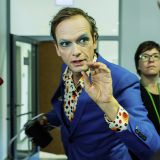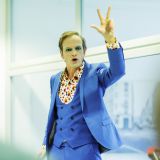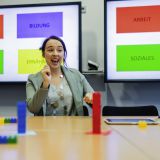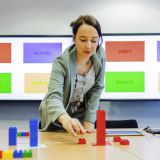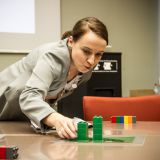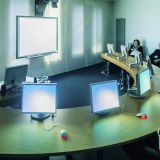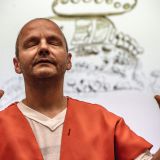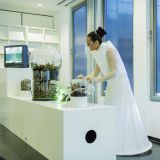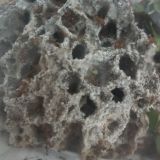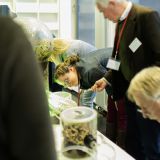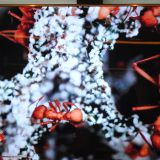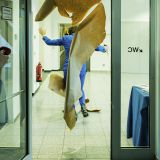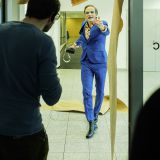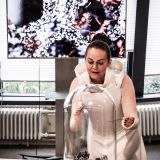
Exhausted Democracy
a theatre evening as applied utopia research (UA)
25 years after the peaceful revolution and the fall of the Berlin Wall, the hopeful departure into a new period, crises determine our lives. Nature, climate, refugees, work, finances, debts, gender - our whole environment seems to break apart. Nothing seems safe anymore. Hopeful upheavals in the Arab Spring seem to have brought us terror as well as the refugee crisis. The growth of neo-capitalism is overwhelming us with financial and bank crises and is undermining social achievements. In the face of terrorist warnings and amok runs, democratic values are suspended by means of a state of emergency. And with anticipatory obedience we sacrifice privacy and data protection. Everything seems to be getting worse and worse. This is what the daily headlines of the media suggest to us. So where is the utopia, the positive one? Can utopia still be imagined today or is it simply swept away by the omnipresent negative image of man (the image of the other as weak, evil and greedy) like a grain of sand in a storm?
But with epigenetics as a young science we should come to the conclusion that it is better to have positive than negative experiences in the world. Epigenetics investigates the phenomenon that experiences (such as traumatic experiences) change genes and are passed on to future generations. The theatre as a guest at the Max Planck Institute (for social research in Cologne and for educational research in Berlin) and now also at the General Administration of the Max Planck Society in Munich does not want to trace the obvious apocalypses of our future, but wants to embark on the difficult path into positive models of thought.
Can we learn from other forms of society, such as ants, which have been successfully living together in civilizations for 150 million years? Are'nt there already existing numerous approaches and models that are already developing in parallel societies and microstructures, as the film "tomorrow - the world is full of solutions", released in June 2016, impressively shows? So let's think together with scientists, artists, philosophers and the public about new economic, political and social models and develop visionary alternative lifestyles.
with: Marc Fischer, Azizè Flittner, Helena Aljona Kühn, Tomasso Tessitori, (Petra Weimer)
Concept: Andrea Bleikamp, Rosi Ulrich
Director: Andrea Bleikamp
Text & Dramaturgy: Rosi Ulrich
Music/Sound: Sibin Vassilev
Ant Installation: Kuai Shen
Animation: Kerstin Unger
Installation (B): Jens Stanke
Costume: Sabine Schneider
PR & Public Relations: neurohr & andrä
Kommunikation Berlin k3 berlin - Kontor for Culture and Communication
Press, Munich: Pfau PR
Production(Location): Mechtild Tellmann
First performance: 23.11.2016, 20 h / 25./26./28./30.11.2016, Max Planck Institute for the Study of Societies, Cologne
18./19./20./21.7.2017, 20 h, Max Planck Institute for Human Development, Berlin
14./15./16./19/20.9.2017, 20 h, Max Planck Institute for the Study of Societies, Cologne
2.-5.4.2019, 19 h, General Administration of the Max Planck Society for the Advancement of Science, Munich
13. September 2020, - an extract from the piece Festival ökoRAUSCH 2020 im MAKK (Museum für Angewandte Kunst Köln)
Res: 0160 8020996 - info [at] wehr51.com
Critics
"An aesthetically superior, cheerfully socio-critical and tremendously stimulating theatrical experience" theater pur
"Each of these concepts is thought-provoking, each is also frightening on different levels. Everyone sets different priorities. Sometimes it's primarily about happiness, sometimes about the preservation of species and civilization, sometimes about the pure, smooth functioning of society. They are all excellently presented, by Tomasso Tessitori, who presents the 'Open Narration' in the orange, Buddhist-style coat with deliberate balance and an inwardly almost exploding cheerfulness, by Petra Weimer, who looks a little bit like an ancient, tired and yet life-wise and very precise ant queen herself, and by Helena Aljona Kühn with her natural-looking mixture of representation consciousness and enthusiasm. On many levels, the seminar, i.e. the communication situation, is reflected and made productive. Andrea Bleikamp's incredibly subtly staged evening is intense, but, with positive energy flowing through it, it remains wonderfully relaxed and makes it possible to absorb the concentrated, albeit stringently served amounts of information with little effort. Thus even exhausted democracy has the greatest strength of Rosi Ulrich's theatre work: it forces the viewer to deal with himself, his needs and desires, his fears, his selfishness, his thought patterns and barriers. This also came out convincingly in the 20-minute, lively discussion that concluded the performance." Andreas Falentin in pure theatre
"For the latest production of the theater-51grad, "Exhausted Democracy", regression is not a promising solution strategy for change. ... There is the OPN, the Open Narration, which completely rethinks political representation, makes states superfluous and attempts to transform power into information and cooperation. The space with the "living artwork" is dominated by an installation in which an ant colony lives. Perfect functionality can be quite beautiful, as the tangle and crawling in the tubes and cylinders shows. ... And then there's "Europien", the place with an unconditional basic income, a negative exchange rate and a Ministry of Happiness." Bernhard Krebs in choices
"Art is a "distant early warning system" wrote the Canadian communication theorist Marshall McLuhan. She could always tell the "old culture" what is about to happen to it. EXHAUSTED DEMOCRACY: #1 Revolution. A theatre evening for applied utopia research rehearses what that could be. ...
One inevitably has to think of Klaus Lazarowicz, Munich theatre scholar, and his idea of the "triadic collusion", the "interplay" of author, actor and audience. But EXHAUSTED DEMOCRACY goes one step further: whoever takes part becomes an art figure himself, part of the play. The imaginary fourth wall, which traditionally separates actors and spectators in the theatre, floats through the production and seems to dissolve completely here and there, like a projected hologram that runs out of energy.
"One can only recognize the connections in retrospect," says the inhabitant of "Myland". This retrospective shows futures that are simultaneously near and far, desirable and dystopian. Futures that you don't have to think to the end to play with in your head. To think to the end, the creators of the play always let you know is your turn. To think visions at all is a goal in itself." Torsten Kathke in: MPIfG News
"I'm an artificial figure," says the man, "an Utopian." He stands on a glowing plastic stool and talks about climate catastrophe, war and unemployment. About us. And about Utopians having a hard time in 2016. They are condensed, strong images. The man explains what is happening now. We will see three rooms one after the other. Each room has a theme: nature, economy, politics. The three groups with their collars divide, each group experiences each space. I have a green ribbon, and my group is the first to look at an ancient but forward-looking model of society: That of the ants.... A society that is 150 million years old. 50,000 individuals, 26 degrees Celsius. The ants fetch leaves from a storage flask and make food for a fungus from them. The fungus produces a fat protein that ants feed on. Right in the centre: the queen. It gives no orders. The hierarchies are flat. ...
We sit around a table and take our Lego bricks out of our pockets. We build towers, in any colour, six towers of different heights are built - the highest for work, education and social affairs. In other words, we see a need for action in these areas in 2016. In "Europien", the country of the future, there is the unconditional basic income. "The financial pressure is small," says the woman. Which of the six areas would we be involved in if we had this basic income, if we lived in the future, in Europien? ...
Then a man in orange would let us into the third room. Nature, the economy - and now politics. The man has a blue thing on his left temple, a kind of implant. A cyborg? Inside an oval row of tables, eight luminous screens, a huge touch flat screen in front. The showroom of the Max Planck Foundation, smart and clinical. ...The man tells of the rejection of the nation state, of the abolition of professional politicians, of informed participation. And of the blue thing on his head, the "blue tank", which networks every citizen with a data cloud so that everyone can always access all relevant information. I think: chic and scary.
The evening is almost over, we have thought three times about a possible future in which people could be happier. If they wanted to. Now comes the final conference, all three groups and all four actors talking to each other for 20 minutes ... The alarm clock rings. The 20 minutes are up. The evening is over. It's about 10 pm, and I'm back on the rushing street. That wasn't a play. It was a journey through possibilities, it was the design of a future. Two hours between reality and science fiction. There was a lot of applause for an extraordinary, stirring and quite meaningful non-theatrical evening." Jörg-Christian Schillmöller in: meinesuedstadt.de
"Thus "Exhausted Democracy" ploughs through the fields of economy, politics and nature and creates models that can be found either inspiring or irritating. After all: the concluding 'conference' really brings people together to talk about great ideas instead of the last 'crime scene'. I think the thought to abolish politicians charming', praises one spectator." Patrick Wildermann in: Tagesspiegel, Berlin.
"The "Exhausted Democracy" is not a frontal theatrical sprinkling, but rather a kind of participatory experience. ... And while you sit there and develop these ideas, you often have the moment when you think: Yes, why not? ... All this is such a radically positive evening. These utopias inspire, you noticed that in the subsequent public discussion, where the ideas presented were passionately discussed further." Michael Hölzen in: rbb Radioeins
In the schedule of WEHR51, produced 2016 by the theater-51grad, in cooperation with Freihandelszone - ensemblenetzwerk köln
guest at the Max Planck Institute for the Study of Societies in Cologne, the Max Planck Institute for Human Development in Berlin and the Max Planck House at the Hofgarten in Munich
sponsored by: Ministry of Culture and Science of the State of North Rhine-Westphalia, NRW State Office for the Performing Arts, Cultural Office of the City of Cologne
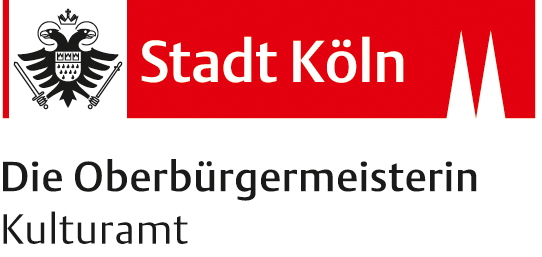 |
 |
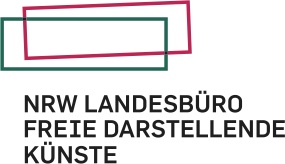 |
 |

